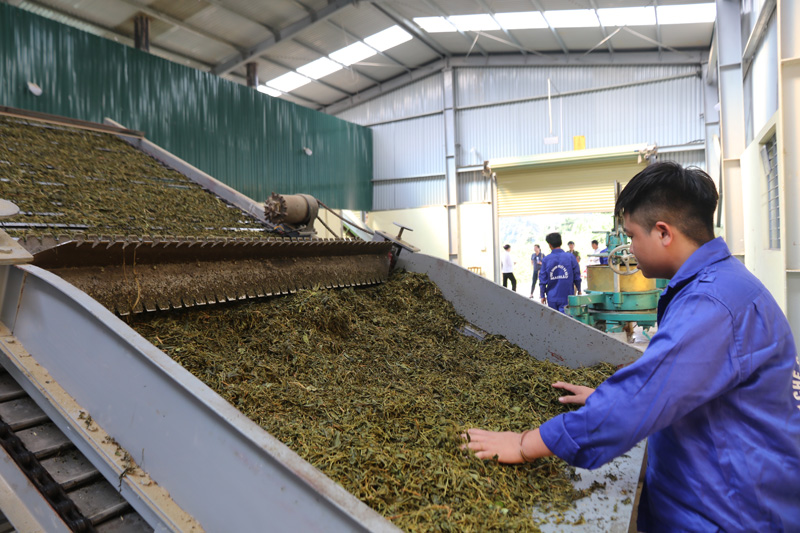
(HBO) - Hang Kia and Pa Co communes in Mai Chau district are changing day by day. The two communes have seen remarkable improvements in infrastructure as well as the material and spiritual lives of local residents.
 A tea
processing plant in Pa Co commune (Mai Chau district) is built with support
from the provincial authorities, creating jobs for locals
A tea
processing plant in Pa Co commune (Mai Chau district) is built with support
from the provincial authorities, creating jobs for locals
By the end of 2019, they achieved six out
of ten criteria for new-style rural area building.
The per capitaincome of Hang Kia
commune was 15.1 million VND in 2019, up 11.1 million VND from 2012. The figures
of Pa Co commune were 12.5 million VND, and 8.3 million VND, respectively. Improvements
have also been seen in culture, healthcare, and education.
In 2019, Hang Kia and Pa Co recorded the
poverty rate at 29.6 percent and 25.46 percent, respectively. They also met the
criteria for new-style rural area building in terms of infrastructure.
Having maintained national
defence-security and consolidated the grassroots-level political system, the
two communes fulfilled security and social order criteria.
The People’s Committee of Hoa Binh provine
has put forth a plan to continue implementing the new-style rural area building
project until 2025. The province plans to mobilise 165 billion VND for the
project.
Under the project, roads, electricity
facilities, schools and healthcare system will be upgraded while support will
be given to production, tourism and socio-culture aspects.
The province also aims to call for
resources for community-based tourism, with focus on exploring local cultural
identity and farming produce.
By 2025, Hang Kia and Pa Co communes
target to reduce their poverty rate by 4-6 percent per year among their Mong
ethnic minority groups. Their per capita income are hoped to reach 30 million
VND. All local children have access to education and no children drop out of
school.
The population growth rates of the two
communes are expected to fall 1 percent. At least 80 percent of local households
earn the "cultural family” status. To ensure sustainable development, they also
aim to have at least two products under the "One Commune One Product”
programme.
Publicity campaign will be promoted to
raise awareness and sense of responsibility of the whole communal political
system and residents in order to fully explore local potentials, thus ensuring
comprehensive socio-economic development./.
a
The Standing Board of the Hoa Binh provincial Party Committee has agreed in principle on a proposal by the Standing Board of the Party Committee of Hoa Binh city to gather feedback on the city’s 1:2000 zoning plan, which forms part of its broader urban development strategy.
Hoa Binh province has made notable progress in public administration reform and digital government development, with the satisfaction index among citizens and businesses reaching over 84%, according to recent government evaluations.
Thanks to great efforts by local authorities in recent times, the governance and public administration performance of Mai Chau district has been significantly improved.
In the afternoon of June 6, the Party Committee, the People's Council, the People's Committee and the Fatherland Front of Lac Son district solemnly held a meeting to celebrate the 139th anniversary of the district's founding (1886–2025) and the 79th anniversary of the establishment of the district's Party Committee (1946–2025). There was the attendance of Mr. Bui Van Thang, the Vice Chairman of the Provincial People's Council; Mr. Quach Tat Liem, the Vice Chairman of the Provincial People's Committee; Ms. Dang Bich Ngoc, the Deputy Head of the National Assembly Delegation of the province; as well as the former leaders of the province and district through various periods, who are the natives of the district.
Implementing the Politburo’s Resolution No. 57-NQ/TW on breakthroughs in science – technology, innovation, and digital transformation is a golden opportunity for the northern mountainous province of Hoa Binh to renew growth model, improve competitive edge and shorten digital gap.
Resolution 57-NQ/TW, issued by the Politburo on December 22, 2024, identifies sci-tech, innovation, and digital transformation as strategic breakthroughs to build a developed and prosperous nation. In Hoa Binh province, this spirit is not just a slogan, it’s being put into action through concrete initiatives that form a "new development triangle”: digital citizenship, digital economy, and digital administration.



 A tea
processing plant in Pa Co commune (Mai Chau district) is built with support
from the provincial authorities, creating jobs for locals
A tea
processing plant in Pa Co commune (Mai Chau district) is built with support
from the provincial authorities, creating jobs for locals